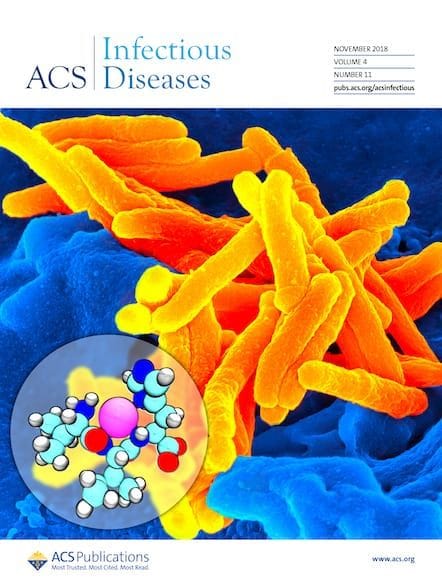Antimicrobial resistance and the dwindling antibiotic pipeline are increasingly recognized as significant threats to global health. With this in mind, ACS Infectious Diseases and ACS Pharmacology & Translational Science will publish a Joint Special Issue on antibiotics in mid-2020 headed up by Guest Editors Dr. Mark Blaskovich, IMB Fellow at the Centre for Superbug Solutions, […]

Antimicrobial resistance and the dwindling antibiotic pipeline are increasingly recognized as significant threats to global health. With this in mind, ACS Infectious Diseases and ACS Pharmacology & Translational Science will publish a Joint Special Issue on antibiotics in mid-2020 headed up by Guest Editors Dr. Mark Blaskovich, IMB Fellow at the Centre for Superbug Solutions, on behalf of ACS Infectious Diseases and Professor Jian Li of the Monash Biomedicine Discovery Institute on behalf of ACS Pharmacology & Translational Science. The submission deadline for submissions to ACS Infectious Diseases has passed, but researchers can still submit their manuscripts to ACS Pharmacology & Translational Science by March 15, 2020.
What to Submit—Deadline Extended to March 15, 2020 for ACS Pharmacology & Translational Science
Dr. Blaskovich and Professor Li want this Special Issue to include a range of articles that encompass the different approaches to new antibiotic development, and they hope to receive a diverse mix of interesting manuscripts.
“We are also soliciting a range of ‘state of the union’ perspectives from key opinion leaders as to current and future directions of antibiotic research and funding, which will add to the overall impact of the issue,” Dr. Li says.
Each journal will focus on different aspects of antibiotic research and further details about each journal Special Issue scope can be found in upcoming Editorials published in the journals in their respective August issues.
For both journals, areas of particular interest include:
- Novel chemotypes and targets, especially if the results are supported by evidence of in vivo activity and drug-like potential
- More traditional approaches of robust improvements to existing classes of antibiotics
- Rediscovery of “lost” antibiotics from decades ago
- Potentiation approaches to rescue existing antibiotics from obsolescence
- Promising new classes acting on novel targets: “The Holy Grail” of antibiotic discovery
In conceiving this Special Issue, Dr. Blaskovich and Professor Li were inspired by some recent exciting innovations and discoveries, including:
- The development of advanced metagenomic analysis and sample identification/deconvolution techniques is creating a renaissance in natural product discovery. Given that Nature’s chemical factory is the original source of almost all classes of antibiotics, these approaches hold promise to identify new natural products from new sources—such as teixobactin (Nature 517,455-459 (2015)) and lugdunin (Nature 535, 511-6 (2016)).
- The Gram-negative active arylomicin antibiotics (Nature 561, 189–194 (2018)), a novel chemotype (macrocyclic lipopeptide) acting on a novel target (bacterial type I signal peptidase), that have been developed within one of the few major pharmaceutical companies still invested in basic antibiotic research (the Genentech subsidiary of Roche).
- The approach described by the Hergenrother group to convert Gram-positive active compounds into Gram-negative actives, based on an analysis of properties required for Gram-negative penetration (Nature 545, 299-304 (2017), Ann N Y Acad Sci.1435, 18-38 (2019)). Hopefully, this is the cusp of a powerful new cheminformatics approach to antibiotic development, in which predictive models will allow for the rational design of new molecules.
Dr. Blaskovich and Professor Li hope they will receive work of similar interest and research that builds on these advances from both academic and industrial researchers studying antibiotics, and they welcome submissions of Articles, Letters, Reviews, Perspectives, and Viewpoints. For details on requirements for each manuscript type, please consult the ACS Pharmacology & Translational Science Author Guidelines and the ACS Infectious Diseases Author Guidelines. You can also find both journals’ scopes below.
Learn more about what sorts of manuscripts each journal is looking for in their August 9, 2019, editorials:
***
Call for Papers: Antibiotics Special Issue
ACS Infectious Diseases 2019, 5, 1264−1264
DOI: 10.1021/acsinfecdis.9b00262
***
Call for Papers: “Antibiotics” − A Joint Special Issue of ACS Pharmacology & Translational Science and ACS Infectious Diseases
ACS Pharmacology & Translational Science 2019 2 (4), 217-217
DOI: 10.1021/acsptsci.9b00053
***
The journal’s editors give priority to studies that fully integrate basic pharmacological and/or biochemical findings into physiological processes that have translational potential in a broad range of biomedical disciplines. Therefore, studies that employ a complementary blend of in vitro and in vivo systems are of particular interest, but they will consider all innovative research with articulated translational relevance.
If you’re not sure if your research is within scope, please email the journal’s editorial team at eic@ptsci.acs.org for feedback.
